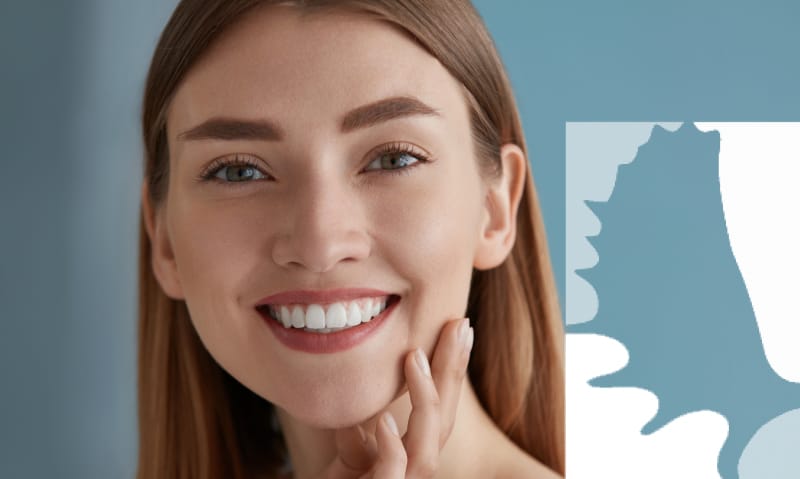Is Tooth Whitening for Me? And Other Questions About Whitening Your Teeth

The use of tooth whitening products and services among adults in the United States has risen yearly, with an estimated 35.86 million Americans giving tooth whitening a try in 2021. You may have considered tooth whitening, too, especially with all the benefits it has to offer. Whiter teeth may make you feel like smiling more. And it can help you let down your guard, making you more attractive, approachable, and friendlier to others. Also, who doesn’t love a great selfie that blasts a bright, white smile? But this isn’t to say that you don’t have questions about tooth whitening. The great news is—we have answers.
What you should know about tooth whitening.
Whiter teeth provide many benefits. They enhance your appearance, boost your self-confidence, make you look more attractive, and even make you look friendlier. Whiter teeth also minimize the look of wrinkles, which adds to that appealing appearance and can help give you a more positive outlook on life.
But even with all those benefits, we know that patients want to be informed about their oral health and tooth whitening. So, we have put together a list of common questions that patients have asked us when considering tooth whitening for themselves. But even better–we have provided the answers.
1. What causes tooth staining to begin with?
Unfortunately, our teeth start to naturally yellow with age. But, certain foods and beverages can contribute to tooth yellowing and staining more than others. Most extrinsic stains (stains on the outside of your teeth) are often caused by coffee, tea, cola, wine, or tobacco products. On the other hand, intrinsic stains (those on the inside of your teeth) are most often caused by an oral injury, certain medications (particularly tetracycline), or overexposure to fluoride.
Extrinsic dental stains are usually cosmetic and are why patients seek tooth whitening. Intrinsic stains, however, could be signs of a medical condition and should be discussed with your dentist or physician. Further, since intrinsic stains impact the inside surfaces of your teeth, they don’t usually respond well to teeth whitening.
2. Should I get my teeth whitened or are porcelain veneers or Bioclear a better choice?
Professional tooth whitening is not your only option when it comes to whiter and brighter teeth. Veneers and Bioclear are options for patients who want whiter teeth, but also have chips or gaps that need correcting. Porcelain veneers are used to correct more severely stained, discolored, chipped, gapped, or misaligned teeth. Veneers are made of either porcelain or composite resin material and are permanently attached to the front of your teeth. Bioclear serves as a unique alternative to porcelain veneers and does not need any grinding or shaving of the tooth. Though not a permanent solution, Bioclear can last more than 10 years.
3. What kind of results can I expect with professional tooth whitening?
Though results can vary from patient to patient, professional tooth whitening can provide some pretty impressive results. At Valley Dental Clinic, we offer patients the choice of in-office or at-home professional teeth whitening.
Both options are safe, simple, and affordable and will dramatically whiten teeth and brighten your smile. Patients can anticipate their teeth becoming anywhere up to eight shades whiter. And you can anticipate having your teeth whitened once every 12 to 18 months, depending on how long the results last.
4. How do I take care of my teeth after they are whitened?
One of the biggest things to remember after any dental treatment is that your teeth require a good oral care routine. This means brushing your teeth twice a day, flossing at least once per day (preferably before bed), and rinsing once per day with a fluoridated mouthwash. Aside from that, we have the following recommendations to help you take care of your newly whitened teeth.
- Avoid coffee, tea, and dark-colored soda.
- Avoid dark sauces like soy sauce, red pasta sauce, and barbecue sauce.
- Avoid dark chocolate.
- Avoid acidic foods such as orange, lemon, or other citrus fruits.
- Use a straw when consuming beverages.
- Use a whitening toothpaste to help your results last as long as possible.
- Quit smoking and use of all tobacco products.
- If you consume alcohol, stick to clear alcohol products.
- Maintain your checkups with your dentist.
5. Can I whiten my teeth at home?
Suppose you want the convenience of at-home whitening. While many products on the market can be used to whiten your teeth at home safely, we want patients to know that these products are not as effective and do not provide the same lasting results as a professional whitening treatment. In that case, we encourage patients to try a patient-prescribed program, such as the one offered by the dentists at Valley Dental Clinic in Wasilla, Alaska.
We strongly discourage patients from trying home tooth-bleaching remedies such as lemon juice, hydrogen peroxide, etc. These products can disrupt the pH balance in your mouth and cause long-term, if not permanent, damage to your dental enamel.
Want white teeth? Visit Valley Dental Clinic in Wasilla, Alaska, to discuss your professional tooth-whitening options.
We know that you want a brighter and whiter smile. We all do. And, we can help you achieve the smile that you have always wanted in a safe, comfortable, and affordable manner. So if you want white teeth, contact us to request an appointment with Valley Dental Clinic today. We can’t wait to work with you on your smile makeover and see the changes that white teeth will make in your life.